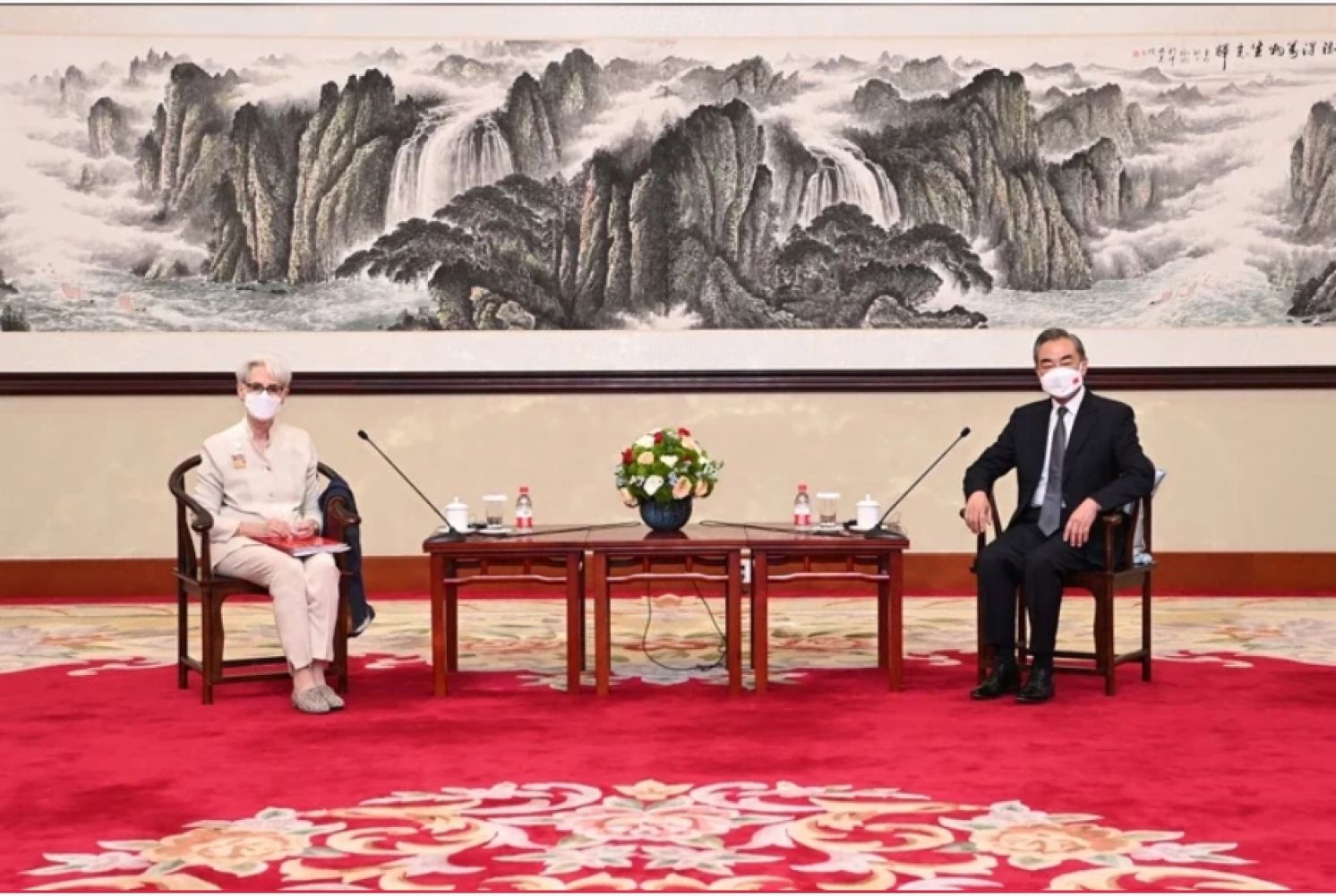
Wang-Sherman Meeting Sets Three-Point Bottom Line, Taiwan Most Significant
United Daily News, July 28, 2021
China’s State Councilor and Foreign Minister Wang Yi met with Deputy Secretary of State Wendy Sherman of the United States in Tianjin on the afternoon of July 26. Wang Yi told Sherman "clearly" and "explicitly" that among China’s three bottom lines regarding U.S.-China relations, Taiwan issue is the most important one.
Wang stated that if Taiwan independentists dares to challenge the bottom line, then China has the right to take any means necessary to prevent, and the United States is advised to act cautiously on the Taiwan issue.
Xinhua News Agency reported that Sherman reiterated U.S. adherence to its one-China policy and does not support Taiwan independence.
The content of the conversation between Wang and Sherman was not announced by Xinhua News Agency until after midnight on July 27. Wang said that the current U.S.-China relations are facing serious difficulties and challenges. Whether the next step is to move towards conflict and confrontation or to improve and develop, the U.S. needs to think carefully and make the right choice.
Wang straightforwardly criticized the administration of President Joe Biden: "In general, it continued the extreme and wrong policies of the previous administration toward China, constantly challenged China's bottom lines, and increased its containment and suppression to China."
First, the United States must not challenge, slander, or even attempt to subvert the path and system of socialism with Chinese characteristics. China's path and system are the choice of history and the people's choice. It has a bearing on the long-term well-being of the 1.4 billion Chinese people and the future and destiny of the Chinese nation. It is a core interest to which China must adhere.
Second, the United States must not try to obstruct or disrupt China's development. The Chinese people, certainly, also have the right to live a better life, and China also has the right to realize its modernization. Modernization is not the exclusive privilege of the United States. This involves the basic human conscience and international justice. China urges the United States to abolish all unilateral sanctions, high tariffs, long-arm jurisdiction and technology blockade imposed on China as soon as possible.
Third, the United States must not infringe upon China's national sovereignty, let alone undermine China's territorial integrity. All Xinjiang-related, Tibet-related, and Hong Kong-related issues have never been human rights or democracy issues, but the issues of right and wrong against Xinjiang independence, anti-Tibet independence, and anti-Hong Kong independence. No country will allow national sovereignty and security to be compromised. As for the Taiwan issue, it is even more important. Although the two sides of the Taiwan Strait have not yet been reunified, the basic fact that the mainland and Taiwan belong to one China and that Taiwan is part of Chinese territory has never changed and will not change. If the “Taiwan independence” force dares to provoke, China has the right to take any necessary measures to stop it. I advise the United States to abide by its promises on the Taiwan issue and act cautiously.
According to the report, Wang repeated three times that he wants to tell the United States clearly and explicitly about China's views and bottom lines. Wang also questioned Sherman “What does the United States’ so-called 'rules' mean?” If it refers to the so-called "rules" formulated by the United States itself and a few countries, what reason is there to impose on China? China did not participate in the formulation, why should it comply? Wang Yi said that the United States is the country that should reflect the most when it comes to observing international rules; the United States should take a good lead in observing international rules, not the other way around.
According to the Xinhua News Agency, Sherman responded that the U.S.-China relationship is the most important bilateral relationship in the world; the United States is willing to continue to have open and frank contacts and dialogues with China, and hopes that the two countries can achieve peaceful coexistence. The United States has no intention of restricting China’s development, nor does it want to contain it. The United States is glad to see China achieve development.
The Mainland Affairs Council rejected Wang’s statement yesterday, stating that the Republic of China is a sovereign state; Taiwan has never been a part of the People's Republic of China; and Communist China has no right to speak up or interfere in Taiwan’s affairs.
U.S. Defense Secretary on China: Committed to Constructive Relations (Compiled by Chen Weiting)
Secretary of Defense Lloyd Austin of the United States began his Southeast Asia tour this week. He delivered a speech at his first stop in Singapore on July 27, expressing his commitment to building a constructive relationship with mainland China and coping with common challenges, but criticized Beijing for claiming sovereignty over the South China Sea, which has no basis in international law.
Reuters reported that Secretary Austin said in a speech at the Think Tank International Institute of Strategic Studies, "I am committed to building a constructive and stable relationship with China, including strengthening crisis communication with the Chinese People’s Liberation Army." and “Big powers should set up a role model for transparency and a communication.”
The report pointed out that despite repeated attempts to arrange talks since taking office in January, Secretary Austin has still been unable to talk to high-level generals in mainland China. Austin is the first cabinet member in Biden administration to visit Southeast Asia.